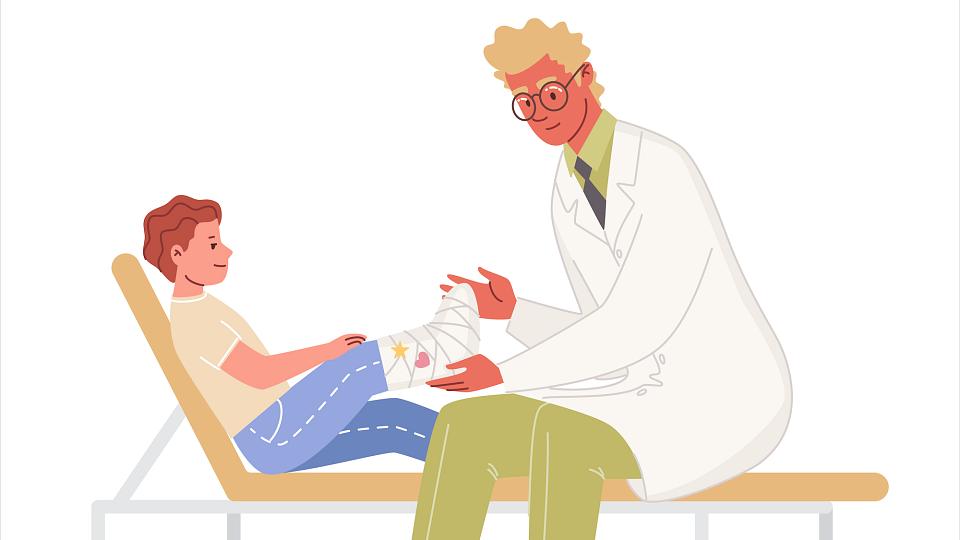
A Parent’s Guide to Safe Football Play for Kids
Each fall, kids of all ages join league or school teams to play flag or tackle football. Whichever type of football a child plays, parents may worry about safety on the field.
Flag vs. Tackle?
Given concerns about concussions and head injuries, the number of young football players has dropped since 2008. But according to Project Play, an estimated 1,000,296 kids ages 6-12 years old played flag football, while another 677,872 played tackle football in 2021.
In fact, a 2015 article by the American Academy of Pediatrics indicated there were tackle leagues for kids as young as age 5, which begs the question: How old should a child be before they begin playing tackle football?
Travis Nolan, MS, LAT, a clinical athletic trainer at University of Utah Health, says it is generally safe for children as young as 5 or 6 years old to begin playing flag football. However, kids should not begin playing tackle football until middle school. This is consistent with legislation that has been introduced in a number of states.
But there has been considerable debate, along with a movement to delay playing tackle football until high school.
The Aspen Institute recently released a report suggesting that flag football be played until age 14—about the time a student begins high school, arguing that it allows children to learn fundamental skills of football while enjoying the physical, emotional, and social benefits of sports participation.
“The most important thing is for students to start learning proper tackling techniques once they begin to play tackle football,” Nolan says. “When we have poor tackling technique, if we're leading with our head down and tackling in that type of form, we're putting ourselves at a greater risk of sustaining a concussion, as well as sustaining a severe or serious cervical spine injury.”
It should be noted, however, that flag football results in the same types of less serious injuries as tackle football, including sprains, muscular injuries, bruises, and contusions.
Specialization Can Lead to Overuse Injuries
When your child demonstrates a love for playing a particular sport, it is easy to let them specialize in that sport at an early age. According to Nolan, specialization at an early age is not a good idea, no matter the sport.
“The main reason is overuse injuries,” he says. “It's probably one of the biggest things that we see in a clinic setting of children specializing in a sport at an early age. One of the most common injuries that we see is an OCD or osteochondral defect caused by injury to cartilage around a growth plate. And that can be a pretty serious injury that could lead to lifelong complications if not handled properly.”
Also, if they specialize too early, kids don’t have the opportunity to use different muscle groups and learn different movement patterns that they would experience participating in a variety of sports or other physical activities like hiking, swimming, skating, or skiing.
Safety Tips
Whether they play flag or tackle football, parents can make sure kids are safe by following a few tips:
- Your child should not be playing more hours than their years in age. For example, a 7-year-old should not be practicing and playing football more than seven hours a week.
- Make sure your child learns the rules of the game. For example, in flag football, they should know that it is a non-contact sport and that tackling is not allowed.
- For younger children, emphasize having fun instead of focusing on competition.
- Make sure coaches are trained in safety and first aid—and that an automatic external defibrillator (AED) is available.
- Make certain your kids are wearing safety equipment properly and that the gear supplied by league or school is certified and in good condition.
- Check the football being used to make sure it is appropriate for your child’s age.
- If your child is experiencing joint pain, have it checked by a physician. If there is a growth plate injury, you want to have it treated promptly, as these types of injuries can cause problems later on in life if not cared for properly.
Learn More About Pediatric Sports Medicine & Orthopedics
Seven Questions for a Pediatric Orthopedic Surgeon
On this episode of Seven Questions for a Specialist, pediatric orthopedic surgeon Joshua Speirs, MD, shares insights into the typical diagnoses he encounters, debunks common misconceptions about pediatric orthopedics...





